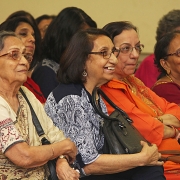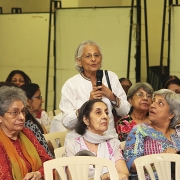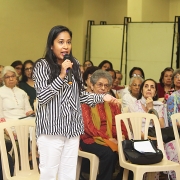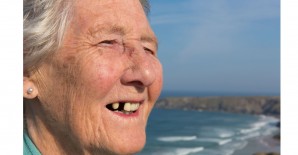
Health
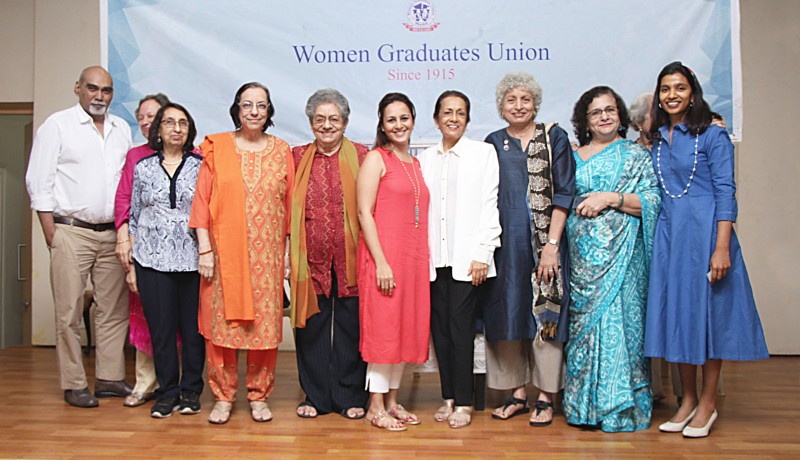
Don’t ignore your mental health and symptoms of depression
What are the psychological effects of ageing on our emotions, motivations and personality? The Counselling and Guidance Centre of the Women Graduates Union in Mumbai recently set out to answer this question, and many more, at a discussion titled ‘Steps to Mental Fitness and Active Ageing’.
On the panel were psychotherapist and author Dr Rochelle Suri, medical doctor and psychotherapist Dr Azhar Hakim, and counselling psychologist and weight management specialist Tara Mahadevan. The panel was chaired by Bina Thadani, president of the Women Graduates Union.
The panel started by addressing the stigma about seeing a psychologist. Dr Hakim put it simply, “If any organ in one’s body faces an issue, one tends to visit a doctor to deal with it. Similarly, the brain, too, is an organ and there can be issues about the way the brain functions, which would need to be dealt with, with the help of trained professionals.”
According to the panellists, the role of the family is crucial. “Family members must spend time with the older person, and notice changes. Notice if they are exhibiting unusual, illogical or irrational behaviour. Have a conversation with them, see if there is an issue … you have to talk about it and downplay the stigma,” said Mahadevan.
Adding to that, Dr Suri brought up a fascinating point when she said, “Untreated depression could also manifest itself physiologically. This is especially observed in Asian cultures because we don’t express ourselves. We tend to somatacise our emotional problems, which explains the high rate of diabetes and other diseases in these regions. Our physiological symptoms sometimes come from not being able to talk about things.”
Depression has to be taken seriously, said Dr Hakim. “If left untreated, it could lead to what psychologists call ‘suicidal ideation’, where people question their existence and harbour thoughts about the pointlessness of living.” While such thoughts can creep in at any stage in life, silvers are all the more susceptible to it.
Here, the chair asked the panellists about the common conception that psychiatric medicine is hard to wean off. According to the professionals, psychiatric medicine has been demonised. Said Dr Hakim, “There is not a single tablet with no side-effects and every doctor will do a cost-benefit analysis to ensure that the benefit of the medication far outweighs the side-effects.”
Further, not every problem needs to be treated with drugs. For instance, claustrophobia is a condition that can be treated with counselling. “However, if we’re dealing with paranoia, it may have to be treated with medication first,” said Dr Hakim. “A person suffering from paranoia will also not be able to trust the doctor from whom they are seeking help and the drugs will help control those feelings.”
Many in the audience were concerned that psychiatric counselling could go on for years. To this, Dr Suri answered, “When you start sessions with a counsellor, you first set your goals. With the help of the psychologist, you can clearly define the areas you want to work on. Once those goals have been reached, you can stop therapy. The follow-up with your psychologist once the goals are achieved depends on the client.”
Mahadevan added that therapy is a game of patience. “We must be aware of our expectations; baggage of 15-20 years won’t go away in just two sessions.”
As a final takeaway, the panellists laid stress upon the importance of routine and structure to our lifestyle. “There is something that gives all human life a purpose, consciously or unconsciously—whether it is school when you are a child, a career in your adult life, spirituality, fitness or any other activity. It is critically important to retain that our entire lives. Because life becomes difficult with the chasms of time; purposelessness becomes critical to address as we age, when there is a sense of vulnerability and feeling adrift,” said Dr Hakim.
The other panellists suggested activities to take up in one’s old age. “At these times, we have to engage in purposeful ageing. Learn coping skills, focus on the thing that you like, accept what you cannot change and take daily actions. Exercise, stay engaged with the external environment, participate in community activities, staying connected,” suggested Dr Suri. “Music, too, has a great effect on the mind; so, listen to it, go for concerts, sing and dance,” Mahadevan added. “In the end, it is about understanding the problem and fixing it yourself. It is a process.”
KEY TAKEAWAYS
- Most of the psychological problems of ageing are not unique to age, but one is more vulnerable to them as age progresses.
- The broad distinction between a psychiatrist and psychologist/psychotherapist is that a psychiatrist will use medication to treat your problem, and a psychologist will talk to you about your problems.
- Patients of psychiatric drugs go through a period of three to seven days with transient effects, while the body is adjusting to the pills.
January 2019
you may also like to read
-
Hot tea!
If you enjoy sipping on that steaming hot cup of tea, think twice. New research establishes a link between drinking….
-
Weight and watch
If you have stayed away from lifting weights at the gym, thinking it might not be a good idea for….
-
Toothy truth
Research has established a clear association between cognitive function and tooth loss when cognitive function score was categorised into quintiles…..
-
PRODUCT OF THE MONTH
Automatic Blood Pressure Monitor Measure your blood pressure and pulse rate with no fuss Hypertension, or high blood pressure, could….



